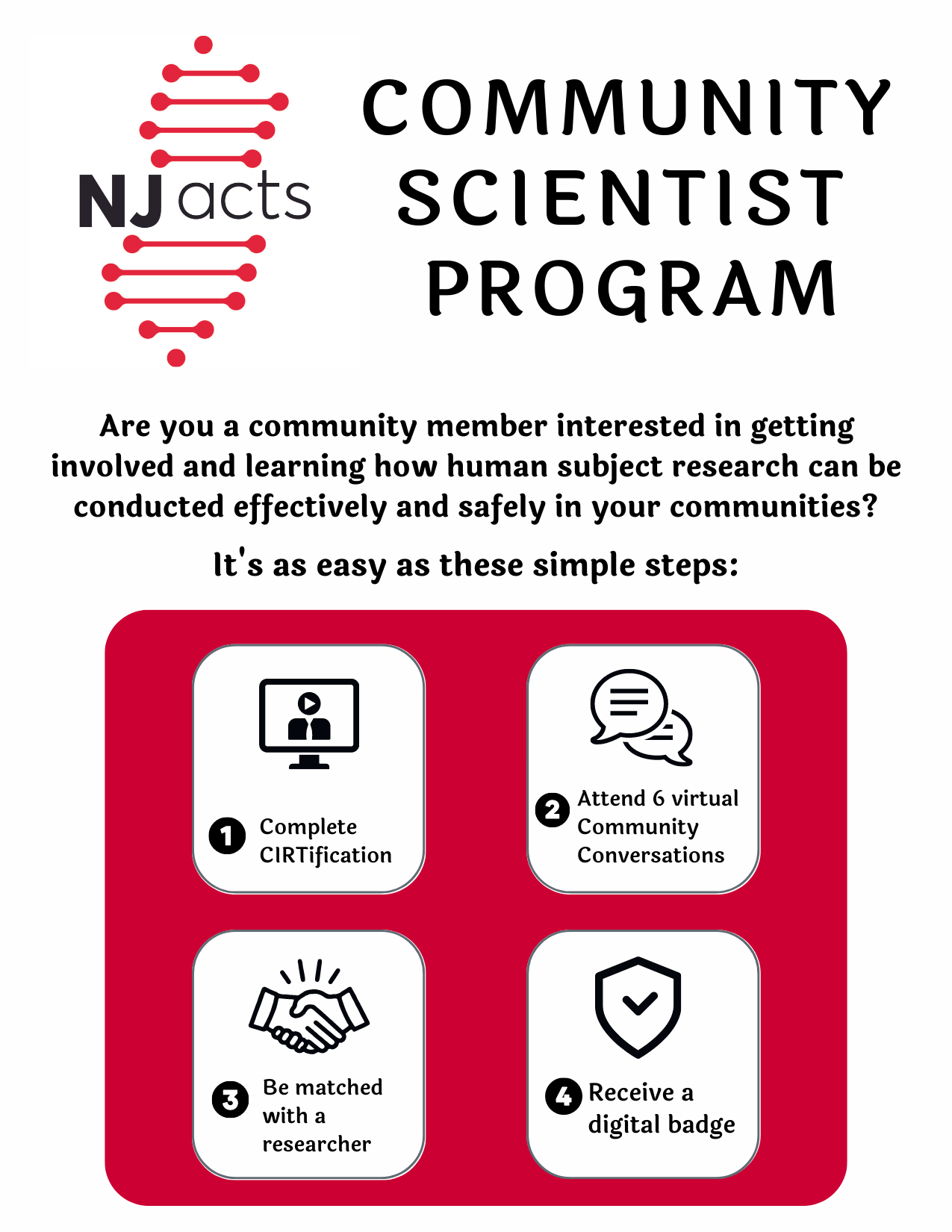180+ networks across 21 NJ counties
COMMUNITY ENGAGEMENT CORE OVERVIEW
NJACTS draws leading academic, industry and community groups together to understand and address the health needs of New Jersey. Central to this is engagement with our community to ensure that our efforts respond to their priorities. Our goal is to conduct research with the New Jersey community, in the community and for the community, and yet, have impact beyond our state’s boundaries.
Stay in Touch!
Join RCommunity!
Join Rutgers Health Service Corps!
Empowering Community-Based Research
Through Cultural and Linguistic Collaboration
- Navigating interpreter-mediated encounters
- Effective translation for research
- Understanding cultural nuances in literacy, trust, and belonging
Through collaboration across disciplines and leveraging expertise within and beyond Rutgers, CrEER ensures that research is inclusive, culturally relevant, and impactful both locally and globally.
👉 Discover how CrEER is shaping the future of community-based research here.
Association for Clinical and Translational Science (ATCS) Membership for Community Members
Did you know that community members are eligible to become members of ACTS through their affiliation with NJ ACTS?
Community members are able to access ACTS’ member benefits, including:
- Discounted registration to the annual Translational Science meeting
- Opportunities to participate in Special Interest Groups and Committees
- Access to the community platform website and more!
Resource for Investigators – CTSA Compendium of D&I Catalogs
Dissemination and implementation (D&I) research focuses on translating evidence-based interventions into real-world settings to improve health outcomes in the broader community.
An open-source CTSA Compendium of D&I Catalogs has been developed by the Clinical & Translational Science Awards (CTSA) Program’s “Advancing Dissemination and Implementation Sciences in CTSAs” working group to support investigators at any stage of their D&I skill-building journey. It provides a curated list of resource catalogs relevant to the conduct of D&I science. The materials include frameworks/theories/models, methods/measures, funding resources, practice resources, training, and health equity resources. Click here to learn more.
CIRTification – A New Alternative to CITI for Community Partners
The rollout of CIRTification at Rutgers has begun. The CIRTification program provides research ethics training alternative for individuals in community organizations, with limited understanding of conducting human research and protecting potential research participants. This option provides training that focuses on establishing the skills in community partners to conduct human subject research effectively and safely in their communities.
To learn more about the program at Rutgers, please visit this link CIRTification.
NJ ACTS COMMUNITY SCIENTIST PROGRAM
This program is designed to provide researchers with rapid feedback from expert community members to ensure their research projects are culturally appropriate and relevant to the community.
PARTICIPATE IN OUR NEXT COHORT!
For more information, please contact njactscommunity@rwjms.rutgers.edu
NJ HEROES TOO
Through the ongoing New Jersey Healthcare Essential Worker Outreach and Education Study – Testing Overlooked Occupations (NJ HEROES TOO), we have gained a wealth of data on COVID-19’s effects, gleaned valuable learnings on attitudes toward testing and vaccines, and improved COVID-19 awareness in underserved communities.

Community Blog
The Hidden Heat Crisis: Report Finds Urgent Need for Workplace Protections Indoors.
Indoor heat exposure is a rising problem for service sector workers, according to a report authored by Hana Shepherd, an associate professor of sociology at Rutgers University-New Brunswick and a senior researcher with the Workplace Justice Lab@RU. The report,...
Could Your DNA Hold the Key to Finding Your Perfect Weight Loss Plan? Experts Explain.
For many on a weight loss journey, figuring out the best method takes time. But there may be more to it than simply following a certain regimen. Recent research suggests that your genes may have an impact on how easily you lose weight, helping to answer the question...
Hot Cars, Hidden Dangers: What Every Driver Needs to Know This Summer.
As temperatures rise each summer, so do the risks to our health – especially inside our vehicles. The interior of a parked car can reach dangerous levels quickly, becoming a trap of superheated air that endangers people and pets. “As a physician, I’ve seen the effects...
How Dad’s Mental Health Can Impact Children.
Over recent years, more and more attention has been given to postpartum and peripartum depression. As mothers have begun to share their stories more openly—and tragedies involving postpartum depression or postpartum psychosis have been covered with more nuance in the...
Americans Largely Disapprove of Attacks on Science and Medicine, Survey Finds.
Americans disapprove of the Trump administration’s policies targeting science and medicine by a margin of more than 2-to-1, according to a survey by Rutgers and other universities. Nationwide data collected by the Civic Health and Institutions Project, a collaboration...
NJACTS Community Engagement Core Available Services
Virtual Community Engagement Salon The NJ ACTS CEC Virtual Community Engagement Salons bring researchers together with patients, community members and health care stakeholders to actively participate in cross-talk — to incubate ideas for engagement in the...



